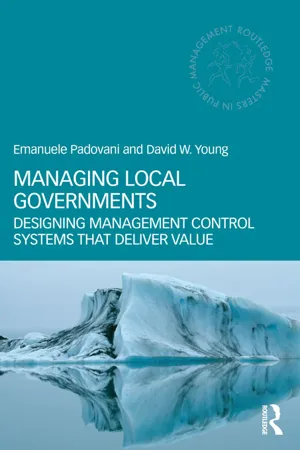
Managing Local Governments
Designing Management Control Systems that Deliver Value
Emanuele Padovani, David W. Young
- 350 pagine
- English
- ePUB (disponibile sull'app)
- Disponibile su iOS e Android
Managing Local Governments
Designing Management Control Systems that Deliver Value
Emanuele Padovani, David W. Young
Informazioni sul libro
Local Government is an area where management skills are tested to the extreme. With political considerations evident both locally and nationally, managing resources can be complex and subject to change.
This book introduces new concepts and new ways of doing business that can greatly enhance the value of the services a local government provides to its citizens, without putting a greater financial burden on taxpayers. Padovani and Young present out-of-the-box thinking based on solid research and experience to discuss topics such as:
- Incorporating outcome indicators into strategic planning and budgeting
- Building a LG's budget with 'cost drivers'
- Expanding the concept of 'enterprise funds'
- Assessing and better managing the risk associated with outsourcing
- Using the concept of 'shadow pricing' to compare public with private sector costs for services
This book is a must-read for students of public administration and management, senior and middle managers in local governments around the world, and citizens who are concerned with more effective management of their local government's programs and services.
A list of suggested extra case studies for each chapter, and a description of the process to follow for ordering them, may be obtained by sending an email to [email protected]. You should request the document "Case Study Suggestions for Managing Local Governments".
Domande frequenti
Informazioni

control systems in local
governments












| Number | % of Total | |
| Africa | 15,565 | 2.2 |
| Middle East-Western Asia | 42,533 | 6.0 |
| Europe | 95,524 | 13.4 |
| Asia Pacific | 373,697 | 52.3 |
| Eurasia | 78,438 | 11.0 |
| Latin America | 16,641 | 2.3 |
| North America | 91,455 | 12.8 |
| Total | 713,853 | 100.0 |